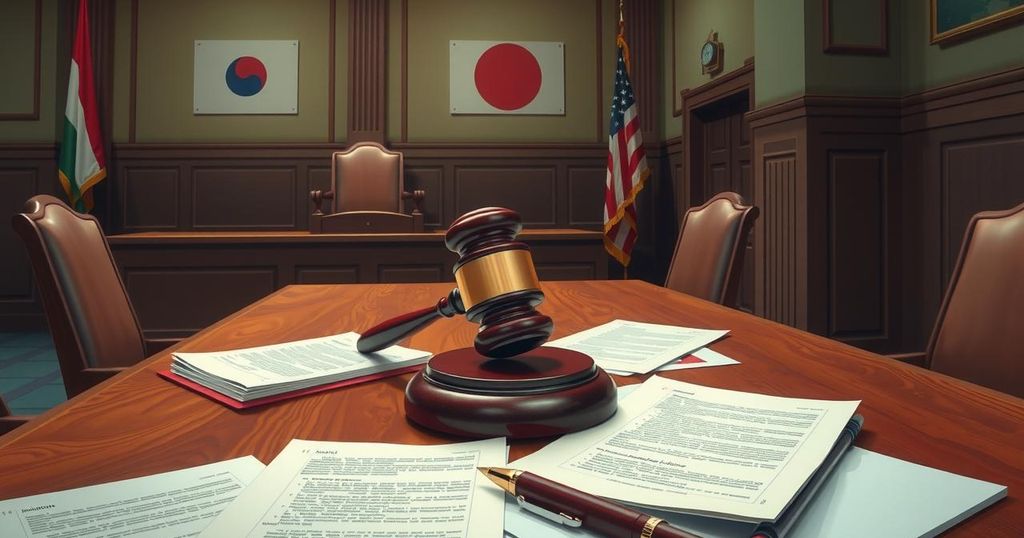World news
AMERICA, AMERICA FIRST, AND RETALIATORY TARIFF ORDERS, ASIA, BRETT SHUMATE, CHINA, DONALD TRUMP, JANE RESTANI, JUDICIARY, JUSTICE DEPARTMENT, MEXICO, NATIONAL SECURITY, NEW YORK, NORTH AMERICA, OREGON, POLITICS, SELECTIONS, SUPREME COURT RULING, TRUMP, UNITED STATES, US, US COURT OF INTERNATIONAL TRADE, VO, WHITE HOUSE
Fatima Alavi
0 Comments
Court Blocks Trump’s ‘Liberation Day’ Tariffs, Challenges Executive Authority
A federal court has struck down President Trump’s recent ‘Liberation Day’ tariffs, ruling that they exceed executive authority and violate laws governing tariffs. The court’s decision challenges Trump’s trade strategy, which aimed to combat unfair trade practices. The White House has labeled the ruling as judicial overreach, while legal experts argue it restricts the President’s ability to impose tariffs without congressional approval. Amid increasing pressure, Trump’s administration has already begun to soften some of its tariff policies and engage in negotiations with China.
A recent ruling from the US Court of International Trade has significantly undermined President Donald Trump’s tariff initiatives. The court invalidated his “Liberation Day” trade tariffs, expressing concerns that Trump overstepped his executive authority by utilizing the International Emergency Economic Powers Act (IEEPA) to implement a broad spectrum of global tariffs announced last month. The ruling emphasized that the White House acted in a manner “contrary to law.”
The judges were clear: “The Worldwide and Retaliatory Tariff Orders exceed any authority granted to the President…to regulate importation by means of tariffs.” This decision has cast doubt on the foundation of Trump’s economic policy, which he has advocated as a means to combat unfair trade practices and boost domestic manufacturing through aggressive tariff measures.
In response, the White House has characterized the ruling as a form of judicial overreach. A spokesperson stated, “It is not for unelected judges to decide how to properly address a national emergency.” This reflects a commitment from the Trump administration to utilize every method of executive power available to address economic challenges.
The ruling was the outcome of two lawsuits filed in May; one involving VOS Selections, a wine importer, and several American companies that claimed harms from the tariffs. Another suit, joined by 12 states led by Oregon, argued the tariffs would raise costs for public goods.
During the hearings, government lawyers claimed the tariff policies helped facilitate international negotiations. Justice Department attorney Brett Shumate argued that an injunction against these tariffs would significantly weaken the US’ position globally. He remarked, “An injunction would completely kneecap the president.”
Judge Jane Restani, however, countered this perspective. “The court cannot for political reasons allow the president to do something he’s not allowed to do by statute,” she stated firmly.
The Trump administration justified their use of IEEPA after declaring a national emergency, suggesting that unfair trade practices present an extraordinary threat to the US economy and security. The White House echoed this assertion in a statement, citing the negative impact of foreign trade practices on America’s economy.
Despite this, the court dismissed the administration’s claims, asserting that the President lacks the authority to impose tariffs without congressional approval. Jeffrey Schwab, the attorney representing the businesses involved, characterized this as an “unprecedented and unlawful expansion of executive authority.”
Interestingly, the White House seems to be scaling back certain tariff measures amid mounting pressures, including delaying a proposed 50 percent tariff on European goods following talks with European Commission President Ursula von der Leyen. Concurrently, the US and China have reached a temporary deal to reduce tariffs by 90 days, easing some trade tensions while exempting key electronics.
This ruling marks a crucial moment that could reshape the landscape of US trade policy and executive power in a significant way.
The recent ruling from the US Court of International Trade represents a serious challenge to President Trump’s tariff agenda, questioning the extent of his executive power under the IEEPA. The court’s ruling highlights the necessity of congressional authorization for tariffs, dismissing claims of national emergency as insufficient grounds for unilateral measures. As the administration seeks to navigate this setback, it is also adjusting some of its tariff strategies amidst pressures from both domestic and international fronts. The evolving situation remains critical as US-China relations continue to stabilize amidst the current trade disputes.
Original Source: indianexpress.com




Post Comment